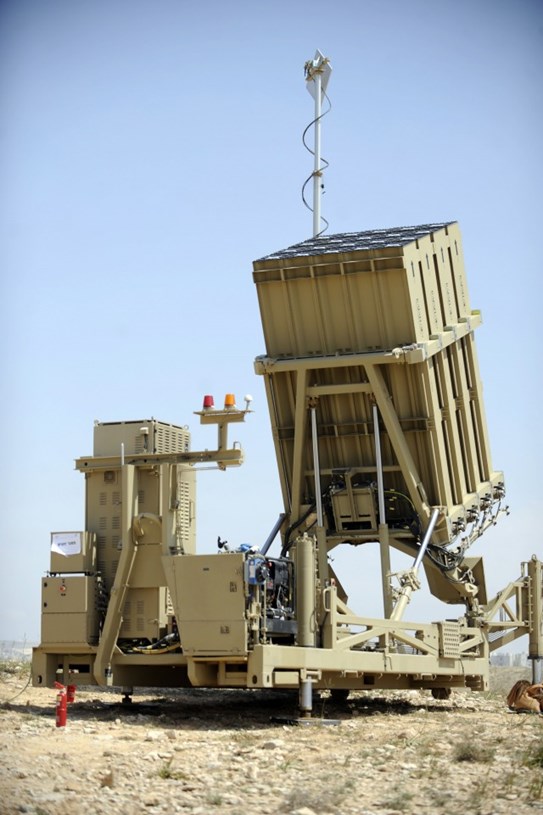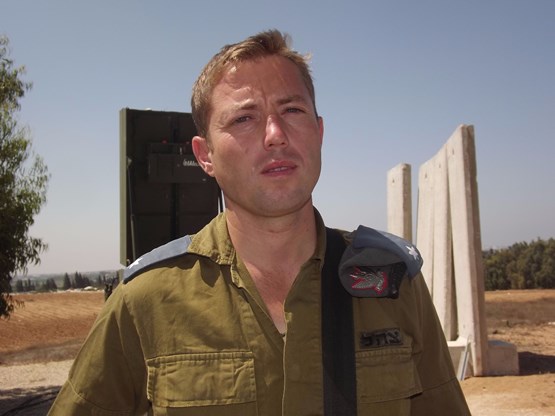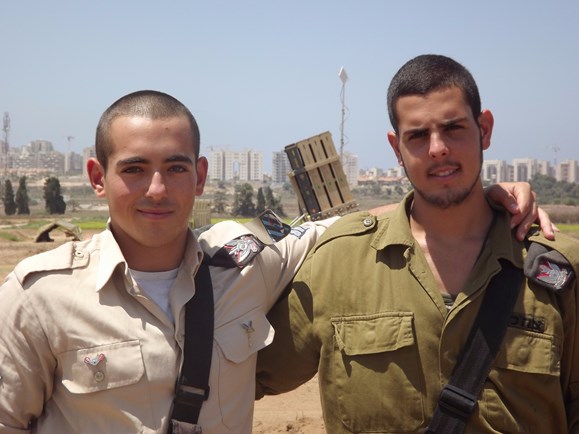Clear Skies Ahead: Meet the Soldiers of the Iron Dome
Since the Iron Dome missile defense system was first deployed in 2011, it has proved an essential part of Israel’s active air defense apparatus. This remarkable system has intercepted over 400 terrorist rockets targeting Israeli communities. We introduce you to some of the soldiers who man this state of the art weapons system.
The Iron Dome air defense system represents the latest technology used by the IDF to protect the people of Israel against the ongoing threat of short-range rockets and missiles. In November 2012, the Hamas terrorist organization fired hundreds of missiles from Gaza at southern and Central Israel. The Iron Dome earned its reputation as a remarkably efficient and effective life-saving defense system by intercepting the vast majority of rockets in danger of striking populated areas. Behind the system stood and continue to stand soldiers from the Israel Air Force’s Air Defense Command, without whom it would all be for nothing.
Positioned near residential areas in Israel’s south, this particular Iron Dome air-defense battery stands ready – always on guard. Several dozen soldiers are organized in tents alongside an Israel Air Force flag flapping in the wind. The living conditions are modest, dictated by the need to maintain mobility. The battery must be able to pick up and move at any moment given the fluid nature of security priorities in the country. An electric generator and some prefabricated buildings form the battery’s major facilities and the home of the unit charged with protecting the surrounding population from terrorist rockets.

Iron Dome batteries are light and mobile while maintaining powerful interception capabilities.
The Mission: Defending the skies
The man tasked with the smooth operation of the battery and the organization of its soldiers is Major Shay Kobninsky. The air-defense officer knows full well the weight of his task.
“Being located just a few kilometers from the cities that we protect, we see with our eyes why we’re here,” Maj. Kobninsky says. “When we work, we do it to save lives.” He isn’t just speculating. When rockets are fired into Israeli territory, Maj. Kobninsky sits in the battery’s command center, tracking the Iron Dome’s interceptor missile to ensure that it strikes the target in time.

Major Shay Kobninsky, Iron Dome Battery Commander. Photo: Shai Levy
“My soldiers work hard and are ready to go at any moment,” Maj. Kobninsky says. During Operation Pillar of Defense in 2012, tensions in southern Israel reached a fever pitch. More than 800 rockets were fired by terrorists in Gaza at southern and central Israel during the 8-day conflict. Of those rockets, many fell in open territory, but many also threatened to strike populated areas. Soldiers of the Iron Dome intercepted more than 400 of them.
Protecting friends and family
For some of the soldiers manning the missile defense battery, protecting their friends and family is part of the motivation. This is the case for Sergeant Tom Cohen, a resident of Ashkelon, who knew that this was the unit he was destined to join when he enlisted in the IDF.
“My family and friends are regularly targeted by rocket fire and I wanted to be directly responsible for protecting them,” he says. “The first time I saw the system intercept a rocket was at the beginning of Operation Pillar of Defense. We were overjoyed at being able to save lives. We were very proud,” Sgt. Cohen added.
Sgt Cohen recalls fondly how warmly the battery’s soldiers were adopted by the surrounding civilian communities, who brought them food, and even special Shabbat meals. “We lacked nothing. The people were very friendly and made every effort to thank us for ensuring their safety,” he said.

Iron Dome operators Sgt. Cohen and Sgt. Baro
Though the stress of the job is at its peak in times like Pillar of Defense, even in periods of relative quiet these soldiers can never lose focus. “A few weeks ago, rockets were fired from Gaza. We must never let our guard down,” says Sergeant Daniel Baro, whose family lives in the southern Israeli city of Be’er Sheva – a city regularly targeted by Hamas rockets.
The weight of their responsibility makes for a potentially tense environment, but the soldiers of the battery do their best to create a pleasant atmosphere.
“I found more than friends here. We face the challenges together and we have become a family,” Sgt. Baro says. “Occasionally I didn’t want to go on leave because nothing could compare to the deed of defending one's family and all the people of Israel,” he says, clearly proud of his service to the State of Israel.

